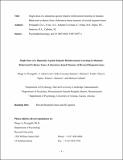| dc.contributor.author | Pizzagalli, Diego A | |
| dc.contributor.author | Evins, Anne | |
| dc.contributor.author | Schetter, Erika Cowman | |
| dc.contributor.author | Frank, Michael J. | |
| dc.contributor.author | Pajtas, Petra E. | |
| dc.contributor.author | Santesso, Diane L. | |
| dc.contributor.author | Culhane, Melissa | |
| dc.date.accessioned | 2010-02-26T18:50:32Z | |
| dc.date.issued | 2008 | |
| dc.identifier.citation | Pizzagalli, Diego A., Anne E. Evins, Erika Cowman Schetter, Michael J. Frank, Petra E. Pajtas, Diane L. Santesso, and Melissa Culhane. 2008. Single dose of a dopamine agonist impairs reinforcement learning in humans: Behavioral evidence from a laboratory-based measure of reward responsiveness. Psychopharmacology 196, no. 2: 221-232. | en_US |
| dc.identifier.issn | 0033-3158 | en_US |
| dc.identifier.issn | 1432-2072 | en_US |
| dc.identifier.uri | http://nrs.harvard.edu/urn-3:HUL.InstRepos:3708465 | |
| dc.description.abstract | Rationale. The dopaminergic system, particularly D2-like dopamine receptors, has been strongly implicated in reward processing. Animal studies have emphasized the role of phasic dopamine (DA) signaling in reward-related learning, but these processes remain largely unexplored in humans. Objectives. To evaluate the effect of a single, low dose of a D2/D3 agonist-pramipexole-on reinforcement learning in healthy adults. Based on prior evidence indicating that low doses of DA agonists decrease phasic DA release through autoreceptor stimulation, we hypothesized that 0.5 mg of pramipexole would impair reward learning due to presynaptic mechanisms. Materials and methods. Using a double-blind design, a single 0.5-mg dose of pramipexole or placebo was administered to 32 healthy volunteers, who performed a probabilistic reward task involving a differential reinforcement schedule as well as various control tasks. Results. As hypothesized, response bias toward the more frequently rewarded stimulus was impaired in the pramipexole group, even after adjusting for transient adverse effects. In addition, the pramipexole group showed reaction time and motor speed slowing and increased negative affect; however, when adverse physical side effects were considered, group differences in motor speed and negative affect disappeared. Conclusions. These findings show that a single low dose of pramipexole impaired the acquisition of reward-related behavior in healthy participants, and they are consistent with prior evidence suggesting that phasic DA signaling is required to reinforce actions leading to reward. The potential implications of the present findings to psychiatric conditions, including depression and impulse control disorders related to addiction, are discussed. | en_US |
| dc.description.sponsorship | Psychology | en_US |
| dc.language.iso | en_US | en_US |
| dc.publisher | Springer Verlag | en_US |
| dc.relation.isversionof | http://dx.doi.org/10.1007/s00213-007-0957-y | en_US |
| dash.license | LAA | |
| dc.subject | D2 agonists | en_US |
| dc.subject | addiction | en_US |
| dc.subject | depression | en_US |
| dc.subject | dopamine | en_US |
| dc.subject | reward processing | en_US |
| dc.subject | mesolimbic system | en_US |
| dc.title | Single Dose of a Dopamine Agonist Impairs Reinforcement Learning in Humans: Behavioral Evidence from a Laboratory-based Measure of Reward Responsiveness | en_US |
| dc.type | Journal Article | en_US |
| dc.description.version | Accepted Manuscript | en_US |
| dc.relation.journal | Psychopharmacology | en_US |
| dash.depositing.author | Pizzagalli, Diego A | |
| dc.date.available | 2010-02-26T18:50:32Z | |
| dc.identifier.doi | 10.1007/s00213-007-0957-y | * |
| dash.contributor.affiliated | Evins, A | |
| dash.contributor.affiliated | Pizzagalli, Diego | |


